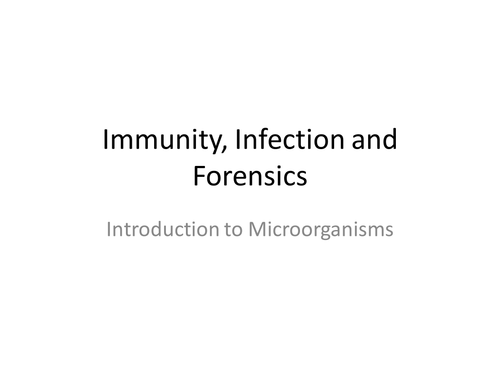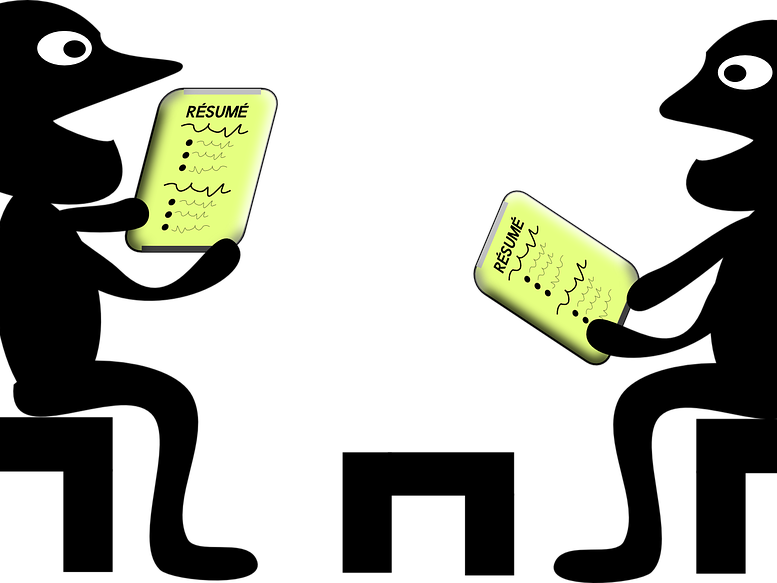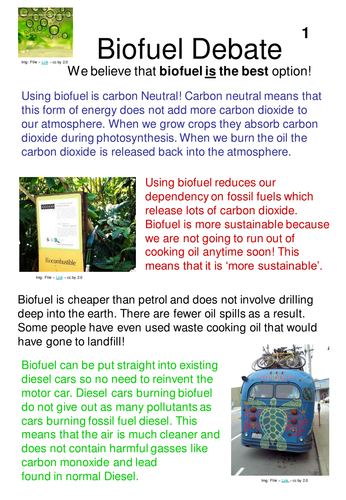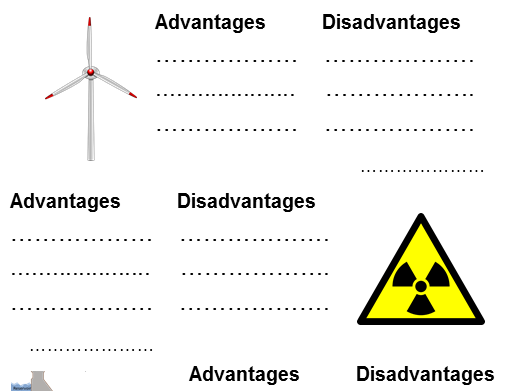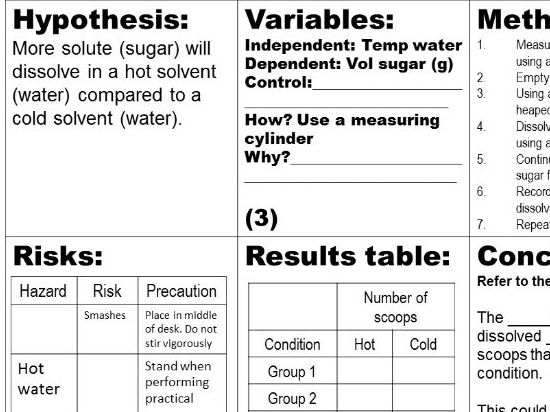70Uploads
42k+Views
8k+Downloads
All resources
Sale

Microorganisms - Virus, Bacteria, Fungi
Students are introduced to the different microorganisms and their contrasting structure. Students compare the scale of the microorganisms to familiar objects. Students will then research the microorganisms further and present their findings scientifically (using one of 6 randomly selected scientific formats).
Sale

Employability Skills - Career planning - Interview Skills - Speed dating
Two activities that promote good interview technique, positive responses and body language. Activity 1: sitting in pairs, students ask the example interview questions to their partner. The partner responds, they flip the card over (print both sides) and reveal the true meaning of the interview question as well as the perfect response. Students compare their response to the suggested response. Activity 2: With students in pairs, sit one on the outside (interviewer) and one on the inside of the desk (interviewee). The interviewer asks the questions provided and takes notes. After 4-5 minutes call 'time' and the students on the inside move to the next interviewer. When students return to the first interviewer they swap and become the interviewer. Worksheet: Interview candidates give their worksheet to the interviewer and receive a score for their body language during the interview. These activities will last 2+ lessons depending on class size.
Sale

Villi, Digestive Enzymes and modelling absorption activity
The presentation considers the adaptation of Villi to perform their role. Investigate how the structure of Villi make it effective at absorbing water and nutrients. The worksheet explores digestive enzymes and assesses the students understanding.
Sale

Thinking Scientifically - Controlled Assessment practise - Control Variable, Conclusion, Evaluation
Practise a controlled assessment or practical in a fun and engaging way. Simple activity requiring effervescent tablets, balances, conical flask, rubber bungs and water. The worksheet encourages students to reflect on method and use data to support a conclusion. Students will identify equipment, control variables and write a method (hint sheet provided). Refer to slide 1 for lesson plan.
Sale

Exam success assembly - Diet, Health, Exercise, PSHE presentation
Use for an exam success assembly, presentation or tutor talk. Includes a diet survey. Tell students this is for a future excursion for honest responses to the menu. Discuss sensible choices using the feedback sheet.
Sale

Biofuel Debate
Students research factors for or against using regular cooking oil as a fuel source. Students present their findings to the group and the teacher is able to monitor any changes in attitude during the course of the lesson. Resources are accessible and presented using familiar scientific formats.
Sale

Energy efficiency and Energy sources activity and Worksheet
Pin up the appliance information cards and give students the data grid. Students collect information from around the room to perform efficiency calculations. The Energy sources worksheet makes recording research into advantages and disadvantages of alternative energy sources quick and easy.
Sale

Earthquakes Seismic Waves Longitudinal Waves
An introduction to earthquakes and the waves generated. Take some time to build the Jelly baby wave generator (instructions and hints included
Sale

Space and Scale Modelling Activity
Introduces students to the vastness of Space. Students create a scale for the planets using the space data. Good opportunity for numeracy and practical if you can get hold of some play-dough (recipe included).
Sale

Streamlining or Friction Practical activity with Control focus
Introduces Friction and streamlining with an emphasis on writing control variables. Students must identify variables to control and justify them. Remind them that the Independent variable changes, the dependent variable is measured and everything else is controlled.
Sale

Worksheets supporting Collins Geography KS3 book. Ideal Homework Physical Characteristics
Worksheets supporting chapter 1 of the Collins revision guide. Ideal as homework task or complete lesson. Topics include: Physical characteristics, Human characteristics Data collection, Geological timescales and plate tectonics. Answers are included.
Sale

New Edexcel GCSE Biology Assessment
Powerpoint online not supported A PowerPoint based assessment consisting of 50 questions from the new Spec. If Macros are enabled the quiz is self marking and give feedback based on weak topics and areas for improvement. Ideal for end of year assessment to identify areas of weakness or gaps in knowledge. May be delivered by a non specialist in an ICT room and answer sheet is included to support them. Students could research the topics suggested when they have finished the assessment. Also available: Physics and Chemistry see my shop Discount for buying as a Bundle.
Sale

Vector and Scalar Physics presentation and activity
Presentation identifying vector and scalar quantities including interactive vector search. Snakes and ladders activity for calculating distance travelled and displacement (ruler and dice required). Thanks for looking. TommyC - Making science accessible to all.
Sale

Create a sustainable battery!
Students are introduced to the history of the battery and how it works. Students make a salt battery using readily available equipment (salt, steel foil, graphite rods, card, water, plastic beaker). Use a multi meter (set to (milliamp) to test the effectiveness of their batteries.
Sale

pH Scale Acid and Base activity
Perform the pH practical activity to test the suggested chemicals and / or display slide 3 for those that you cannot test. Print slide 2 for students who must colour the pH scale and place the chemicals alongside the periodic table. As a plenary ask students to record which chemicals will neutralise each other (e.g. wasp sting --> Bee Sting).
Sale

Thinking Scientifically - Controlled Assessment practise - Control Variable, Conclusion, Evaluation
Practise a controlled assessment or practical in a fun and engaging way. Simple activity requiring a kettle, ice, boiling tubes, large beakers, salt, water, stop watch and thermometers. The worksheet encourages students to reflect on writing the method and using data to support the conclusion. Students will identify equipment, control variables and write a method (hint sheet provided). Refer to slide 1 for lesson plan.
Sale

Thinking Scientifically - Controlled Assessment practise - Equipment, Control Variable, Risk
Practise a controlled assessment in a fun and engaging way. Simple safe practical requiring Sugar, cups, hot and cold water. Train students to identify risks, control variables and write a method. Refer to slide 1 for lesson plan.
Sale

DNA to Amino Acid to Protein Activity
Transcription and Translation activity simplified for low to moderate ability or high ability starter activity. Turn a strand of DNA into a sequence of Amino Acids then translate these into a protein. Extension activity explores the effects of mutations and the beneficial or limiting effects of this. Students could explain what they have done for a plenary.
Sale

Worksheets supporting Collins KS3 History Christendom, Magna Carta, Black Death, Norman Conquest
Worksheets to supplement the popular Collins KS3 revision book or stand alone research activity. Consolidate learning with these worksheets and make it feel more like a lesson than a reading exercise. Chapter 1 Britain 1066 - 1509 topics: The Norman Conquest, Christendom and the Crusades, Magna Carta, The black Death, The Peasants Revolt. Please give 5 star and I will upload Chapter 2.
Sale

History Quiz Christmas theme 2018
History Quiz covering topics including: Norman Conquest, Christendom, Magna Carta, Black Death, Interregnum, Industrial Revolution. Ideal for end of term activity. Loosely linked to Christmas. The Quiz will run itself so the teacher can join in the festivities. This fact based activity can also act as a revision lesson for these topics.

